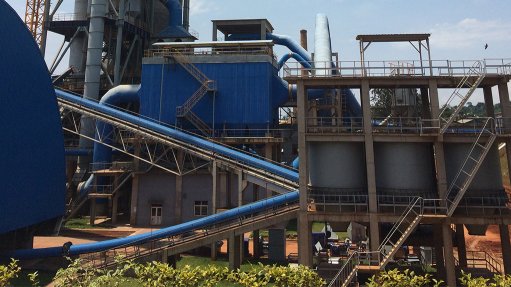
Rwanda’s sole cement producer Cimerwa, which is 51%-owned by JSE-listed PPC, expects production at its new 600 000 t/y modern dry process plant, at its head office in Bugarama, to ramp up to full capacity by mid-2018.
Speaking to Engineering News Online during a plant tour, PPC international relations MD Njombo Lekula said the $170-million plant was currently running at 60% capacity.
The plant was launched in August 2015 and Cimerwa’s 100 000 t/y wet process plant was decommissioned. However, the company is considering keeping certain components of the old plant in service.
Cimerwa CEO Busisiwe Legodi said the new automated dry process plant aimed to stem high cement imports into the country.
“The construction of the new plant was driven by the infrastructure growth in Rwanda. When the government realised the cement producing capacity it had was not going to support the growth of infrastructure development in the country, it had to resort to imports. It then decided to find partners and build this plant,” she explained.
The new plant is currently operating using electricity from a State-owned 14 MW power station but would be connected to the national electricity grid by September.
The new plant also achieved a more than 50% water saving for Cimerwa.
Legodi noted, meanwhile, that Cimerwa had sufficient high-quality limestone reserves to produce the best quality cement for both the domestic and export markets.
Cimerwa’s main target market was Rwanda, with the city of Kigali the main consumption node, accounting for between 55% and 65% of domestic demand. The target export markets included Burundi, as well as south and north Kivu in the eastern Democratic Republic of Congo (DRC).
“We are already exporting cement to Burundi and eastern DRC, where the quality of the product is quite renowned,” she said.
The local cement would initially be sold at the plant, but the company was evaluating the business case for making deliveries, mainly to Kigali.
While the current business model assumed bagged product sales only, the company was optimistic about the near-future prospects of delivering a bulk solution to the industrial and construction segments of Kigali.
Legodi added that the support from the Rwandan government had been exceptional. The State subsidised more than 25% of the plant’s electricity costs and paid the diesel costs.
Meanwhile, Lekula revealed that, by 2020, Rwanda’s per capita cement consumption would outpace the country’s current cement production capacity, adding that Cimerwa aimed to ensure that its production exceeded the country’s demand.
The growth of the cement industry was currently low, said Legodi. Industrialisation was growing but was not matching the growth of the young population, requiring further industrialisation investment.
“The potential for growth lies in processing what we have in the country; for example, Lake Kivu has a lot of natural gas and so we need to make our own electricity; we also have a lot of fruit and need to look at export opportunities. I see Cimerwa becoming a regional player. We are looking at opportunities and realised there are many,” she said.